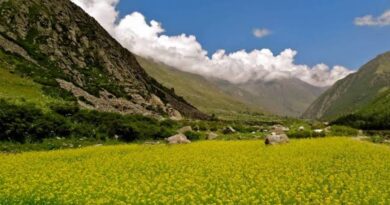Former Civil Servants Urge Finance Commission to Create ₹50,000-Crore “Green Fund” for Himalayan States
Over 100 retired civil servants from across India have written to Dr. Arvind Panagariya, Chairman of the 16th Finance Commission, urging the panel to recognize the vital ecological role of the Himalayan states and to establish a “Green Fund” worth ₹50,000 crore to safeguard the fragile mountain ecosystem.
The group, operating under the banner of the Constitutional Conduct Group (CCG), comprises retired IAS, IPS, IFS, and IRS officers — many of whom have held senior positions in the central and state governments. In their letter, they warn that the Himalayan region is “literally going to pieces” due to unchecked hydropower projects, deforestation, and climate-induced disasters.
“The Himalayas Are Dying”
The letter highlights alarming figures:
- In the last four years alone, Himachal Pradesh has lost over 1,200 lives and suffered damages worth ₹18,000 crore due to flash floods and landslides.
- Uttarakhand, between 2012 and 2022, recorded 18,464 natural disasters, claiming 3,554 lives, not including the catastrophic Kedarnath floods of 2013 which caused losses of US$ 3.8 billion.
- Economic losses in 2025 alone are estimated at ₹5,000 crore in Uttarakhand.
“These are not merely natural disasters but the result of reckless development and climate change,” the group wrote. “Can India afford the destruction of the Himalayas?”
A Plea for Ecological Justice
The CCG urged the Commission to account for the non-monetary contributions of Himalayan states — such as carbon sequestration, biodiversity, and water provisioning — in the central devolution formula.
Quoting a 2025 report from the Indian Institute of Forest Management, Bhopal, the group noted that Himachal Pradesh’s forest wealth is valued at ₹9.95 lakh crore, with an annual Total Economic Value (TEV) of ₹3.2 lakh crore. Yet, these ecological assets remain unacknowledged in fiscal transfers.
The letter recalled that the 12th Finance Commission had introduced a ₹1,000-crore “Green Bonus”, of which Himachal received just ₹20 crore — a token amount, they said, that needs to be expanded exponentially.
Recommendations to the 16th Finance Commission
The former bureaucrats proposed two key measures:
- Increase the weightage of “Forest and Ecology” from 10% to 20% in the Finance Commission’s formula, while correspondingly reducing weightages for population and income distance indicators.
- Include high-altitude ecological zones — such as snowfields, glaciers, and alpine pastures — in the definition of forest areas, as these regions act as “water towers” that sustain the northern river systems.
Conditional Green Bonus
While demanding fiscal compensation, the CCG also cautioned against unregulated spending. They proposed that any Green Bonus allocation should be linked to measurable environmental outcomes, including improved sustainability, stricter control of illegal mining, and better urban and tourism planning.
A Shared National Responsibility
“The Himalayas are not just the concern of mountain states — they are the lifeline of North India,” the letter stated. “If these mountains lose their forests, rivers, and glaciers, the Gangetic plains could turn into a desert, repeating the fate of the Indus Valley civilization.”
The letter echoes the recent warning by the Supreme Court, which observed that Himachal Pradesh could “vanish from the map of India” if environmental destruction continues unchecked.
Signatories Include Prominent Former Officials
Among the 103 signatories are prominent former officials such as Ashok Lavasa (former Election Commissioner), Shivshankar Menon (former National Security Adviser), K. Sujatha Rao (former Health Secretary), Wajahat Habibullah (former Chief Information Commissioner), Julio Ribeiro (former DGP, Punjab), and Aruna Roy, former IAS officer and noted social activist.
A Call to Recognize “The Green Wealth of the Nation”
The CCG’s appeal comes as the 16th Finance Commission continues consultations with states to finalize its recommendations on revenue sharing between the Centre and states. The letter underscores that ecological assets must be treated as national wealth, not state liabilities.
“Protecting the Himalayas,” the signatories conclude, “has to be seen as a shared responsibility. The destruction of these mountains will not just be the loss of a landscape — it will be the undoing of India’s environmental and cultural heritage.”



